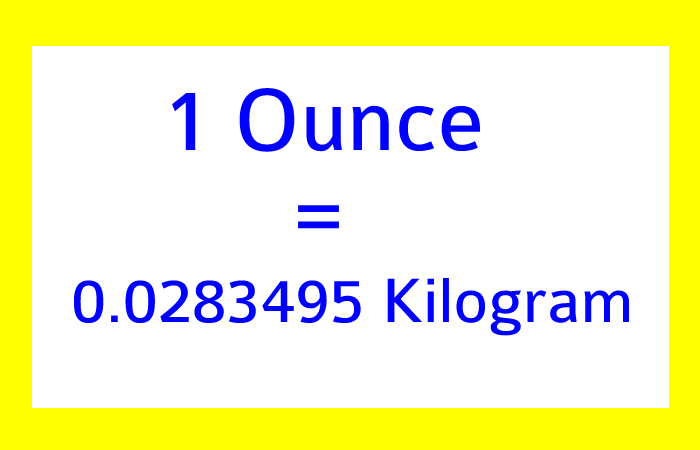Table of Contents
Ounces are in a kilogram
To convert Ounces are in a kilogram
1 Ounce = 0.0283495 Kilogram.

We are not familiar with ounces, so occasionally changing this unit of weight from kilograms is more complicated than we like. Fortunately, we’ve developed a one-kilo-ounce converter for you so you can calculate the equation between these two units of weight. You must enter the number of kilograms you want to convert to ounces and press the Calculate button to find out the result. We will express you in ounces or, if you wish, divide it into pounds and ounces. We also have a calculator to go from ounces to kilos if you want reverse conversion.
From the equations we saw in the previous point, we can get a formula that facilitates the change between these two units of weight and which we show you below:
m (oz) = m (kg) / 0.02834952
For example, we’re going to convert 3 kilograms to ounces using the previous mathematical expression:
m (oz) = m (kg) / 0.02834952 = 3 Kg / 0.02834952 = 105,8219 oz.
Formula to Convert Ounces are in a kilogram.
To convert kilos to ounces, use the conversion formula below:
Value in ounces = value in kilos x 35,274
Suppose you want to change 2 kilograms to ounces. In this case, you will have:
Value in ounces = 2 x 35,274 = 70,5479 (ounces).
What is Ounce?
An ounce is a concept that can have different etymological origins. When the term derives from the Latin uncĭa, it is used as a certain weight or as a specific portion of something. Specifically, in the latter case, it derives from a Latin word that can translate as “one of the twelve parts into which a Roman pound divide”. As a unit of mass, the most used ounce is equivalent to 28.7 grams. This weight arises from dividing the pound into sixteen equal parts: each is an ounce.
Another type of ounce is the troy ounce, used for weighing metals. In this case, the ounce is equivalent to 31.1 grams. Regularly, we also use the term ounce in another sense. Specifically, we refer to the portions that make up a chocolate bar. An example is: “I can’t resist eating an ounce of chocolate.”
The ounce can also be used as a unit of volume to measure a liquid. Differences also arise here, as the North American fluid ounce is not equal to the Great Britain fluid ounce. For Americans, one ounce equals 29.57 millilitres, while for the British, it equals 28.41 millilitres—the notion of an ounce expected in the field of cocktails.
What is Kilogram?
A kilogram is a measurement unit that is a constant reference for universal measuring instruments. The kilogram, whose symbol is kg, is one of the seven basic measurement units defined by the International System of Units (SI). These units serve to homogenize the physical magnitudes of weights and measures worldwide. The other six basic units are the meter (m), the second (s), the ampere (A), the Kelvin (K), the mole (mol), and the candela (cd).
Although the kilogram or kilogram is used in most countries of the world, not all have adopted the kilogram as a unit of mass/weight, such as the use of the pound in the United States and England. In this way, to know the equivalence of a kilogram to a pound, the conversion must be made, taking into account that 1 kilogram is equal to 2.2 pounds (1 kg = 2.20462 lb).
Frequent Question
- How many ounces are in a kilo?
- How much is 1 kilo?
- How much is 1 kilo in ounces?
- 1 kg. How many oz is it?
- How to convert kilos to ounces?
- How do you transform kilos into ounces?
- What is the formula to change from kilograms to ounces?
Conclusion
The formula to go from kilograms to ounces is very simple: you have to multiply the number in kilograms by 35.2739619 and get the weight in ounces.
